The world of employee wellbeing can be a maze of shiny objects and misinformation. Business leaders, trying earnestly to look after their people, are confronted with conflicting messages at every turn. It’s confusing and disorienting.
How can you be sure of the best wellbeing initiatives for your people? What benefits should you include or exclude? What kind of support delivers the most meaningful value?
The perplexity of wellbeing options risks paralysis by analysis. Yet, time is of the essence. As employee turnover rates rise, recent Australian statistics impress a sense of urgency:
- 9% of workers are currently considered engaged
- 42% of workers took time off in the last 12 months due to concerns about their mental wellbeing
- 77% of employees experienced burnout last year
- 92% of workers want their next employer to offer mental wellbeing support
Sources: Gartner, Sonder, Asana,
The link between wellbeing and effectiveness
“Workers’ wellbeing is a key factor in determining an organisation’s long-term effectiveness. Many studies show a direct link between productivity levels and the general health and wellbeing of the workforce”, says the International Labour Organisation (ILO).
This means that for high-performing organisations, employee wellbeing strategies have graduated from a ‘nice to have’ to an ‘essential operational tool’ – and board-level questions have changed from ‘should we commit?’ to ‘what should we commit to and how can we measure it?’.
Wellbeing advocates – who often struggle to secure appropriate funding for their workplace wellbeing initiatives because they are daunted by the requirement to supply quantitative metrics – should embrace the opportunity to develop an evidence-based and measurable approach that eliminates guesswork and takes confident forward steps towards improving employee wellbeing.
Myth: paid time off cures burnout
In the past twelve months, the global media has done an exceptional job of glorifying companies that have gifted their employees with paid time off (PTO) to curb burnout and improve mental health and wellbeing. Business leaders who have not yet followed suit have surely felt the urge to, as their peers and role models flaunt their generous gestures and press mentions.
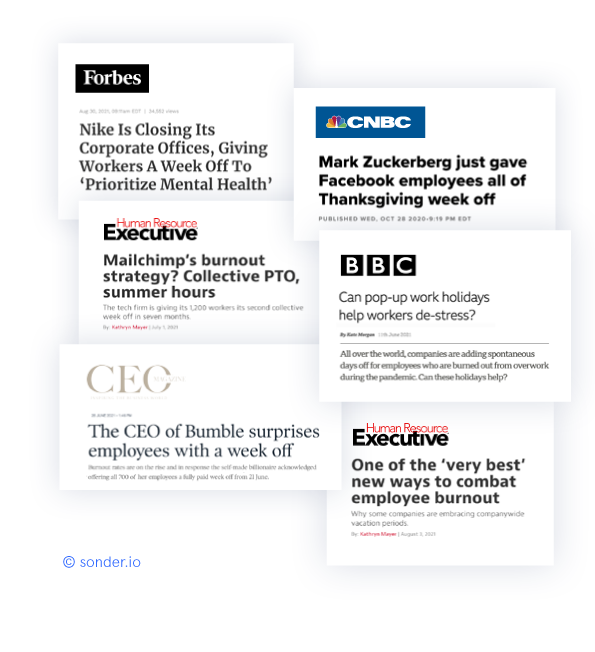
What the evidence says
PTO can set the tone for a more balanced and healthier workplace, but it is a band-aid for burnout, not a cure. Burnout is a multifaceted, multidimensional issue that can rarely be solved with short bursts of time off work – employer-funded or otherwise.
Definition of burnout
“Burnout refers to the physical and emotional erosion that an employee can experience when they feel regularly unsatisfied, powerless and overwhelmed at work.” It is “an occupational phenomenon… resulting from chronic workplace stress that has not been successfully managed.
Causes of burnout
Originally attributed to only work factors, there are now multiple studies attributing burnout to both work and personality factors. These tables share examples of work and personality factors which can contribute to burnout.
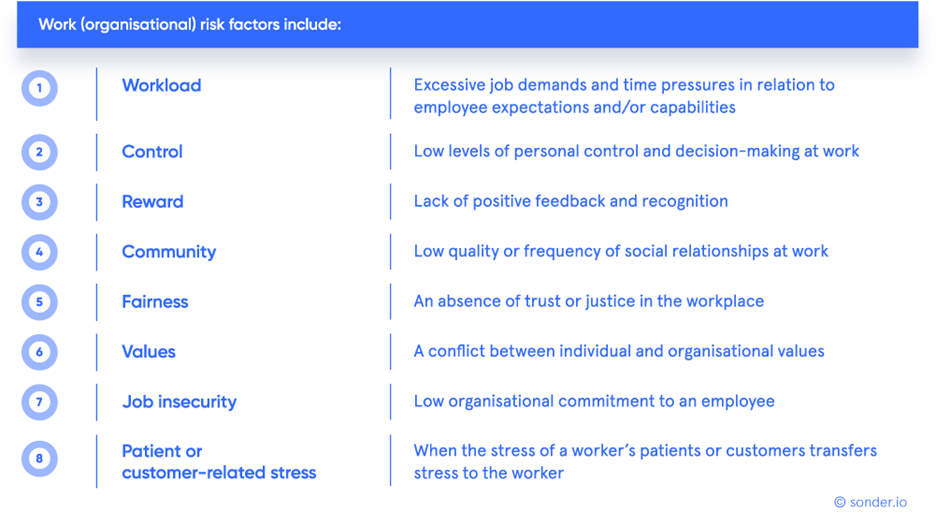
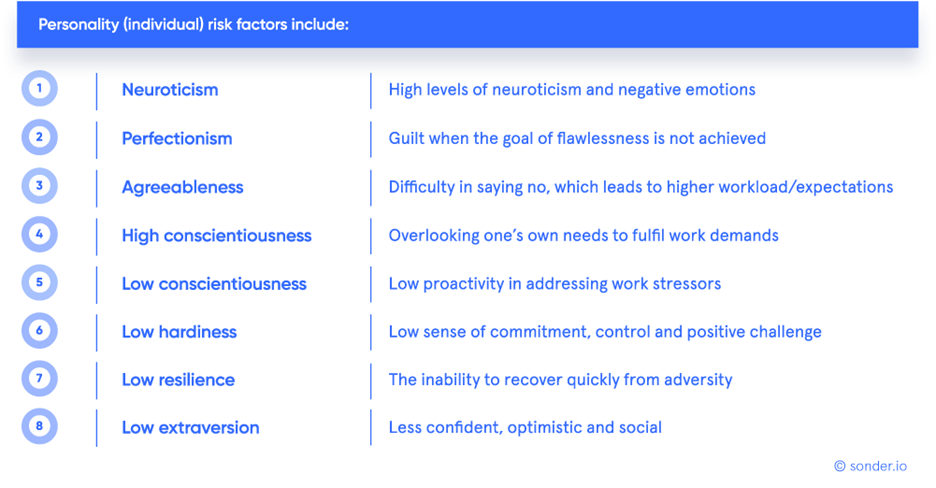
Reducing burnout
The phenomenon of burnout is commonly a sign of deeply entrenched issues in the workplace. Until every risk factor is addressed, and sustainable, supportive and protective systems put in place, any claim that burnout has been cured will likely be one-dimensional and premature.
References: Yonsei Medical Journal, International Review of Management and Marketing, The Urban Review, Infinite Potential, Clinical Practice and Epidemiology in Mental Health
Myth: digital-only is the answer
As the lines blur between our personal and professional lives, employees are increasingly turning to their employers for better mental health and wellbeing support. Looking for easy wins and low-effort solutions, many organisations are banking on self-help digital tools as the answer.
With between 165,000 and 325,000 health and wellness apps now commercially available, these apps are typically convenient, widely available, highly scalable, relatively easy to implement, and delegate much of the responsibility back to employees themselves.
What the evidence says
Self-help apps can provide valuable initial guidance, but they should complement, not substitute, professional health care and robust clinical governance. They should enhance a more holistic and comprehensive employee wellbeing strategy, not be the strategy.
Lack of ongoing engagement
Self-help apps risk user drop-off. This can result in delays to care or the absence of care (if there is no human support or ongoing follow-up).
“Widely celebrated as the solution to the supply and demand imbalance in mental health care, digital mental health interventions have flooded the marketplace to supplement specialty mental health care. However, the evidence supporting their efficacy is mixed [see also here], and engagement with digital mental health interventions, particularly mobile apps that lack ancillary human interaction, is abysmal. Users are unlikely to use these interventions more than a few times,” conclude Rudd and Beidas.
Carlo, Ghomi, Renn and Areán concur; “the vast majority [of health apps] remain largely unevaluated… [and] even when apps are evidence-based, their public health impact is often curbed by poor adherence”.
“Furthermore, the movement of specialty mental health care, an intensive public health intervention, from the hands of clinicians and into standalone digital interventions ignores decades of research about the importance of social support and may further isolate individuals who need human connection the most. Given the robust social support literature, it is not surprising that digital interventions with the highest levels of engagement are those that include some form of human interaction,” said Rudd and Beidas.
Gaps in patient assessment
Digital app users often struggle to fit their circumstances into the predefined categories in an app. Limitations of the tools can also lead to a ‘Dr Google’ type of self-diagnosis. This represents a dangerous gap in patient assessment because it neglects that many wellbeing issues are complex and multilayered.
For example, “around 51 per cent of Sonder’s support cases are caused by something other than the issue stated. [To illustrate,] self-diagnosed financial stress might, upon professional triage, uncover a need for urgent safety support for domestic violence, plus mental health support for isolation, depression, and suicide ideation all underwritten by a complex medical problem,” says Dr Jamie Phillips, Medical Director and Head of Member Support at Sonder.
Myth: wellbeing cannot be measured
Wellbeing advocates often struggle to secure appropriate funding for their workplace wellbeing initiatives. Many times this is because their business case focuses on qualitative data, but budget holders prefer quantifiable metrics – to satisfy their due diligence, allay their sense of risk, and promote colleague accountability of results.
What the evidence says
The good news is that there is widespread acceptance that wellbeing can be measured, albeit a lack of consensus on a common measurement standard.
There have been at least 30 formal measures of wellbeing developed over the past 50 years, using different definitions and applied to the organisational context. It is not necessary to adopt an existing formal measure, but an organisation may find it useful to review existing measures when articulating the metrics that will be relevant to their specific workplace.References: Download report to access full reference list.
How to measure wellbeing
Unlike sales and expense figures, wellbeing metrics do not fit naturally on a balance sheet. Similar to employee performance metrics, they need work behind the scenes to define what is being measured, when, how and why. This upfront effort, together with a concern about choosing the wrong metrics, can deter organisations from starting their journey.
However, it’s important to remember that wellbeing metrics will change over time – based on organisational learnings, industry best practices and a maturing definition of wellbeing. The necessity to start, learn and pivot should trump the requirement for perfectionism at commencement.
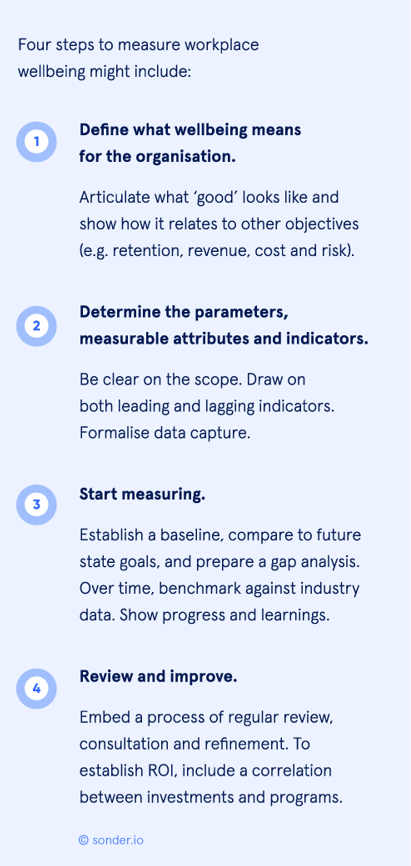
Employee wellbeing metrics
The measurement of employee wellbeing typically involves a combination of leading and lagging indicators. Let us explain…
Leading indicators
Leading indicators (“inputs”) help predict future outcomes and events. They “look forward through the windshield at the road ahead”.
Examples include:
Organisational support
- Leadership buy-in (as rated by employees)
- Leaders ‘walk the talk’ about healthy work practices
- Leaders talk about their mental health and wellbeing
- Leaders encourage discussion of employee wellbeing
- Leaders commit to best practice in employee wellbeing
- Funding
- Amount budgeted for employee wellbeing
- Staff time allocated to wellbeing management
- Policies and processes (existence and quality)
- Safety and wellbeing policies
- Flexible work policy
- Remote work policy
- Attractive leave policies
- Diversity, equity and inclusion policy
- Bullying and harassment policy
- Clear and effective change management processes
- Regular insights gathered
- Formal feedback loops in place
Scope of the wellbeing strategy
- Physical health and safety
- Psychological health and safety
- Job design
Programs and initiatives
- Professional development opportunities
- Wellbeing programs and initiatives
Employee awareness
- Amount of visible health-promoting collateral
- Number and reach of wellbeing information sessions
- Number of ‘speak up’ programs and champions
- Portion aware of the different wellbeing initiatives
- Portion who understand each wellbeing initiative
Employee training
- First aid (and mental health first aid) training
- Resilience training
- Compassion training
- Workplace Health and Safety (WHS) training
- Diversity, equity and inclusion training
Participation and engagement
- Employee reach of programs and initiatives
- Participation and uptake rates
- Employee health behaviours (e.g. the number who are meeting the daily physical activity and alcohol consumption recommendations, as well as the number who are smoke-free)
Employee satisfaction
- Employee focus groups
- Employee Net Promoter Score (eNPS)
- Engagement surveys
References: Download report to access full table and reference list.
Lagging indicators
Lagging indicators (“outputs”) show tangible results. They “look backwards through the rear window at the road already travelled”.
Examples include:
Employee health
- Prevalence of health conditions
- Employee assistance program (EAP) usage
- Number of referrals to other third parties for help
Claims and premiums
- Health insurance claims
- Workers’ compensation claims
- Health care spend (including premiums)
Work time
- Annual leave usage rates
- Sickness and absenteeism rates
- Lost time injury frequency rates (LTIFR)
- Lost work days to organisational factors
- Return to work success rates and timeframes
Legal and compliance
- Recommended actions from WHS audits
- Workplace investigations
- Workplace litigations
Attrition
- Peer reviews and 360-degree feedback
- Voluntary attrition rates
- Exit survey information
References: Download report to access full table and reference list.
The dilemma of choice
Over the years, employee wellbeing offerings have evolved into a smorgasbord of choice. Whilst this represents positive progress, it has also created:
- A complex landscape for employees to navigate – unless they have a single point of entry to their organisation’s wellbeing service offerings; and
- A daunting requirement for wellbeing leaders to provide whole-of-business insights – unless their services are integrated and actively capturing meaningful data on all of their initiatives.
Myth: employee perks keep people engaged
Yoga studios, rainbow slides, NASA sleep pods, organic lunches, daily ice cream allowances, volleyball courts, climbing walls, gyms, saunas, massage, ping-pong tables, games arcades, puppytoriums, hair salons, in-office scooters, childcare, acupuncture, Olympic-sized pools for SCUBA-certification at lunch, Botox-injection rooms, tanning beds, wine bars, food trucks, mini supermarkets, karaoke parties, music jam sessions and 100-seat theatres – according to the media, these make up the modern office and “keep employees happy”.
The transition to the virtual office has brought with it new creativity. Westpac organised virtual zoo and museum visits, while other companies have offered virtual escape room experiences, remote flower-arranging and cocktail-making courses, virtual bingo tournaments and watercolour classes, Lego championships on Zoom “for employees with their home-bound kids”, doughnut home deliveries, care packages and more – to help employees adjust.
Out of the office, employee perks have become a burgeoning industry. Third-party providers are promising everything from employee discounts to gender reassignment surgery and egg, sperm and embryo freezing, as well as house cleaning, concierge services, relocation assistance, dry cleaning, festival tickets, trips to Disney World, health and insurance benefits, student loan pay downs, plus free transportation to and from work – all to keep employees happy.
Download our report to access the full list of source references.
What the evidence says
Perks can deliver bursts of happiness, but they don’t keep people engaged. Long hours, overloaded to-do lists, poorly designed and dead-end jobs, ill-trained managers and bullying colleagues can quickly erase any memory of the free organic sandwich that an employee had after their nap in the NASA pod at noon.
“Awesome”, “unusual” and “unbelievable employee perks” promoted in the media serve to generate powerful clickbait headlines, attract job candidates, surprise and delight current employees, and deliver short-term wins for an organisation – but they only scratch the surface.
The release of ISO 45003 reminded us that workplaces are complex ecosystems and a multitude of factors influence employee satisfaction and engagement – including how work is organised, social factors at work, and the safety of the work environment.
Factors contributing to an engaged and mentally healthy workplace
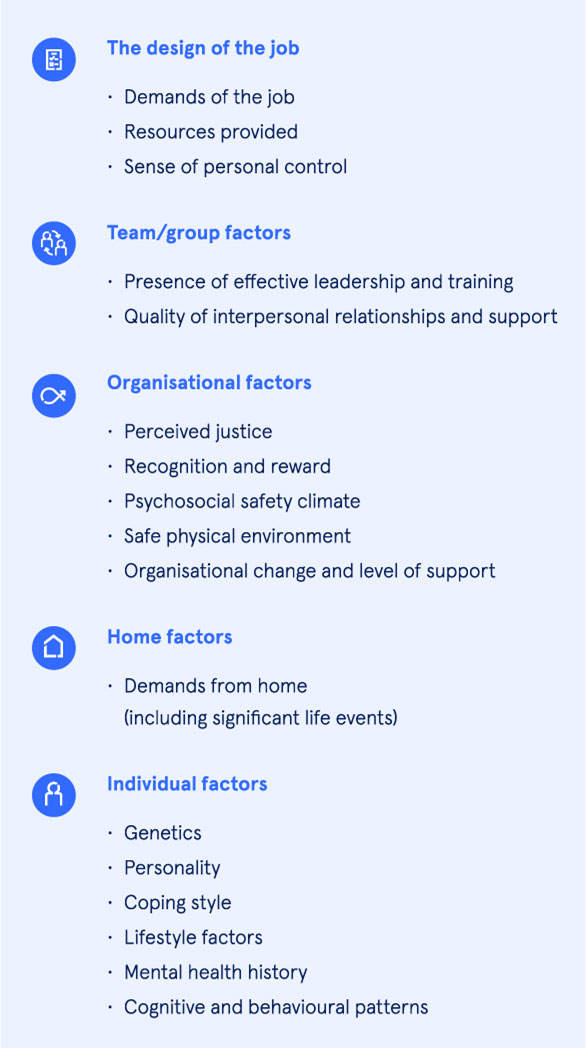
The dark side of perks
Too many employee perks might also be a bad thing. “These benefits are not being offered out of largess. It’s done because organisations want employees to work 24/7. If you never have to leave to get your dry cleaning, to go to the gym, to eat or even go to bed, you can work all the time. They’re golden handcuffs,” says Gerald Ledford, a senior research scientist at the Center for Effective Organizations at the University of Southern California’s Marshall School of Business.
Perks can also lure employees into a false sense of security. For example, an employee taking advantage of flexible work practices might think everything’s rosy, but beneath an organisation’s diplomatic veneer, their colleagues and managers can perceive those employees as unprofessional and lacking commitment – which is penalising their career prospects. Conversely, an employee not taking advantage of perks and flexible work practices might be punished by the organisation for not taking part in policies put in place to incentivise them.
Putnam, Myers and Gaillard say, “We tie these tensions, and the management of them, to an overarching dilemma in implementing workplace flexibility, the autonomy–control paradox”. This occurs when management wants to create an environment with a high level of autonomy, but simultaneously retain high levels of monitoring and oversight.
Download our report to access the full list of source references.
Concluding thoughts
The five key takeaways are:
- Paid time off does not cure burnout
- Self-help apps should be complemented by human care
- Employee wellbeing can be measured
- Psychological debriefing after trauma can do more harm than good and;
- Perks do not secure employee engagement in the long term.
This post is an excerpt from our evidence-based report: 5 myths of employee wellbeing. To read more from the report, please click here.
24/7 medical, safety and mental health support
Sonder is a workforce health and safety platform that provides the right care at the right time for personal safety, medical, and mental health needs. The Sonder app offers 24/7 immediate connection to expert support via chat or call, personal safety tools like smart check-ins and journey tracking, and access to wellbeing resources such as personal assessments and self-care content.
For more information about how Sonder can help you reduce people related risks and costs, ensure compliance, and build a resilient, productive workforce, contact us here.
About Sonder
Sonder is a technology company that helps organisations improve the wellbeing of their people so they perform at their best. Our mobile app provides immediate, 24/7 support from a team of safety, medical, and mental health professionals – plus onsite help for time-sensitive scenarios. Accredited by the Australian Council on Healthcare Standards (ACHS), our platform gives leaders the insights they need to act on tomorrow’s wellbeing challenges today.



